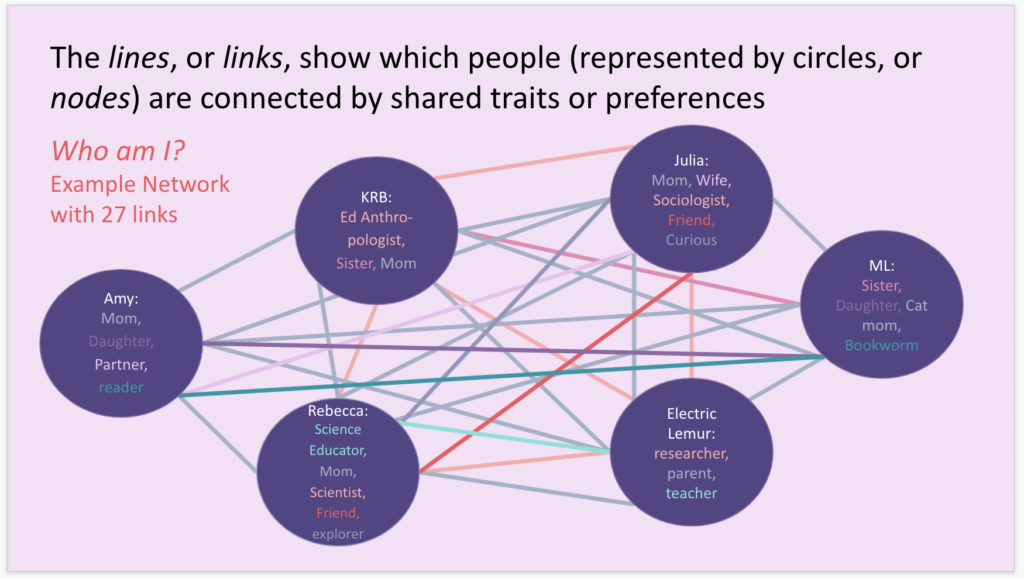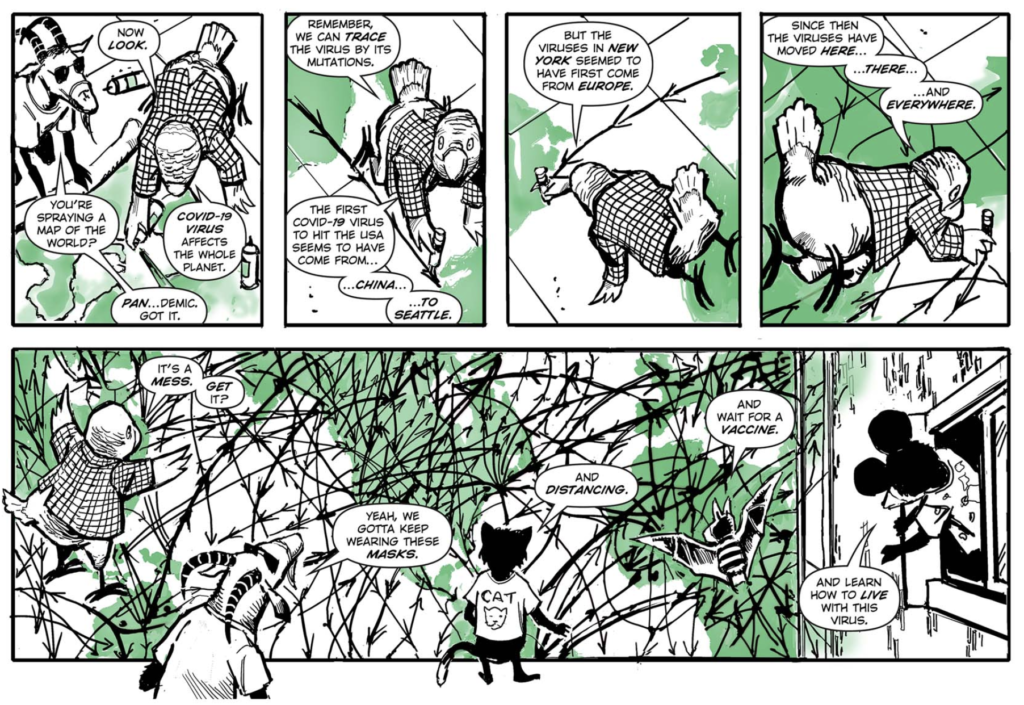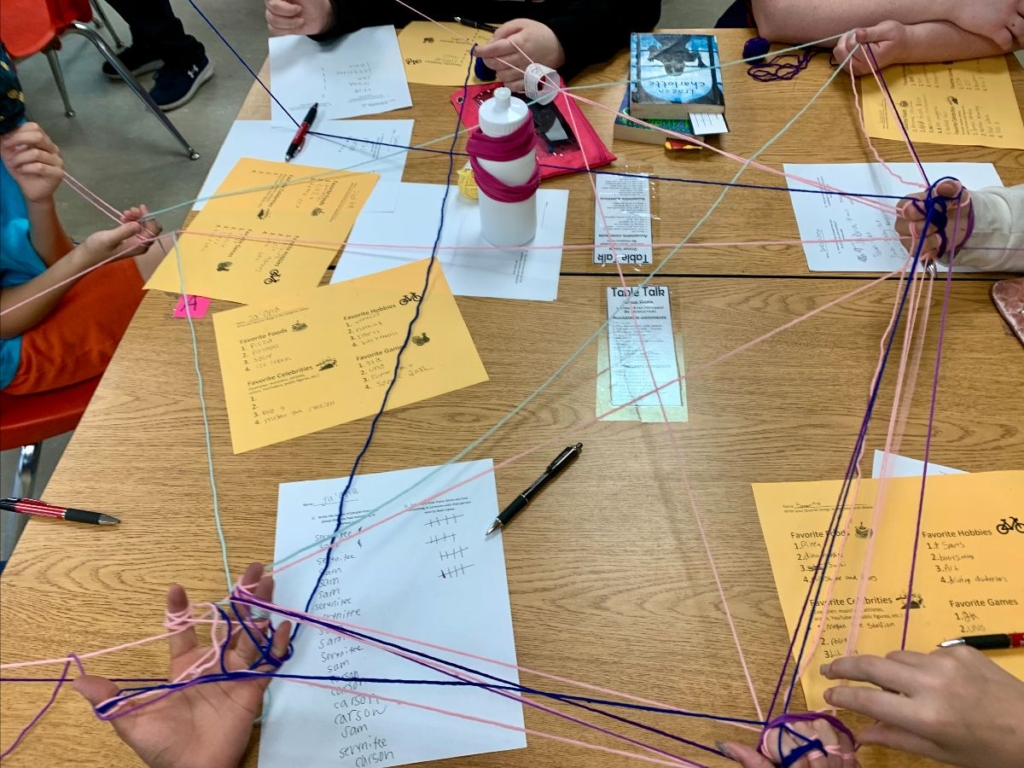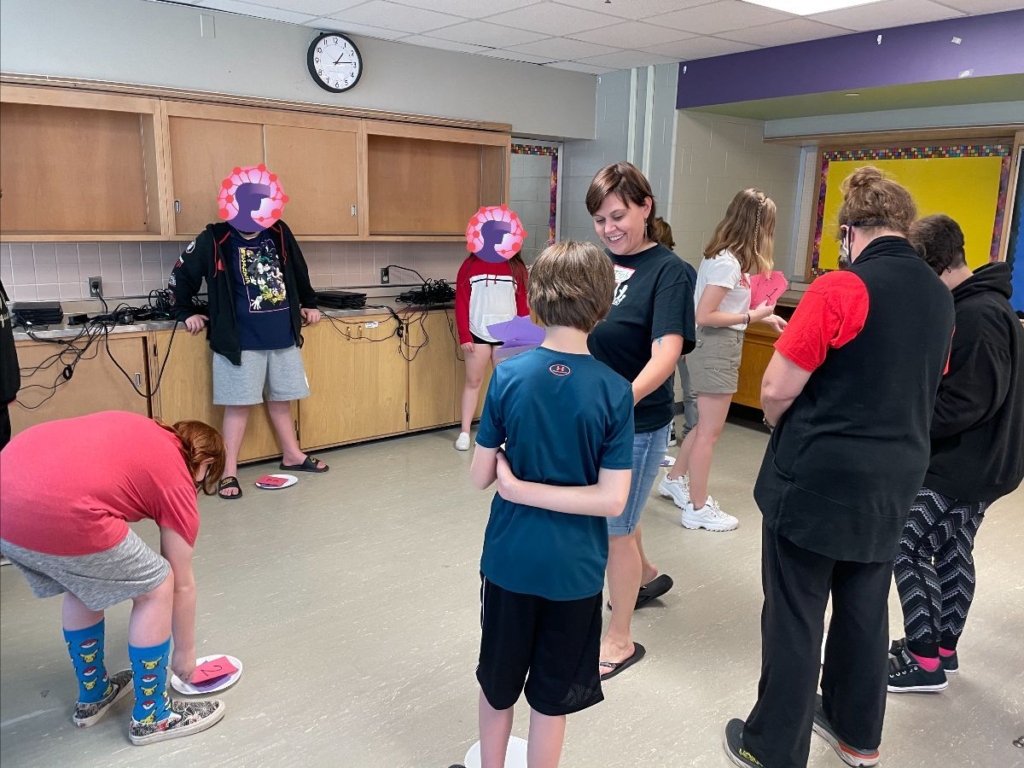Worlds of Connections Newsletter
Volume III, Issue 2
28 July 2021
Letter from Dr. McQuillan
Hello Worlds of Connections community,
I’m excited to write to you at the end of our third year of Worlds of Connections (WoC). We continue to see the relevance and value of our Science Education Partnership Award (SEPA) goals. We keep seeking to spread knowledge and excitement about network science among members of underrepresented minority communities and supporting diversity in bio-behavioral and biomedical careers.
The news is full of stories about complex systems that matter for our individual and collective health. News outlets in Summer 2021, for example, described how smoke from fires in Oregon created unhealthy air conditions in New England, COVID-19 mutations in India led to outbreaks of the Delta variant in rural parts of the United States, and rising water temperatures in rivers in the central U.S. prevented baby salmon from reaching the ocean. These stories reflect how hidden connections within and among systems can become visible when crisis arises.
We are excited to tell you about our efforts to share the benefits of network science tools with k-12 science and math teachers. Working on a summer graduate-level class for teachers helped us see the need to first develop what the Waters Center for Systems Thinking calls “Habits of a Systems Thinker,” in part based on the book Thinking in Systems by Donella Meadows. We also found the tool Loopy, developed by Nicky Case, useful for visualizing dynamic complex systems. Systems and systems models are a cross-cutting concept in Next Generation Science Standards. Showing how network science is useful for modeling and understanding complex systems, therefore, helps k–12 teachers who have much to cover in limited time.
In this newsletter, you will also learn about our work with Co-I Christine Cutucache, Nik Stevenson, and the NE STEM 4U team in Omaha to publish four network science activity plans, the summer class for 6th–12th-grade math/science teachers, and our recent publications.
We continue to value the work that you all are doing in your respective specialties. Please let us know if you have ideas to further our efforts (for example, topics for the informal activities or storylines for the emerging media art deliverable). Learn more about the details of our project below and at worldsofconnections.com.
Thank you for your support.
Project Accomplishments
Network Science Activities & Deliverable Development
NE STEM 4U Network Science Activities
Since our last newsletter, our team has created, piloted, evaluated, and refined network science activities for middle-school-aged youth in both virtual and in-person informal settings. Throughout Spring 2021, NE STEM 4U Program Coordinator and STEM Professional Development Educator Nik Stevenson guided a team of NE STEM 4U undergraduate mentors in refining network science activities, which were tested in Omaha clubs. We also piloted two activities in Lincoln during a four-day Community Learning Center session at Dawes Middle School from June 1–4. To make fun, engaging activities that give youth exposure to network science concepts used in health research, our internal evaluator Dr. Amy Spiegel conducted extensive formative evaluation throughout the activity development process.
Four network science activities, “Ecology,” “Genealogy,” “Fish Supply,” and “Play Dough Liaisons,” will appear in a published book of NE STEM 4U informal STEM activities. The book will be available for download on the NE STEM 4U: Omaha website.
- Youth discover connections to each other by creating a network model of shared interests out of yarn.
- Co-I Hill shares a smile with a youth participant during a network activity.
[NOTE: All persons depicted above had been fully vaccinated against COVID-19 prior to June 1 and/or wore masks while participating in the June 1–4 session.]
C’RONA Pandemic Comics
In partnership with the National Science Foundation (NSF) RAPID project Using Popular Media to Educate Youth About the Biology of Viruses and the Current COVID-19 Pandemic (PI Judy Diamond), we supported the development of a pandemic comic whose storyline features network concepts. Additionally, WoC team members Dr. McQuillan, Dr. Trish Wonch Hill, Meghan Leadabrand, Dr. Spiegel, and Dr. Wendy Smith authored an essay offering network science insights for pandemics. All the pandemic comics, our essay on tracing connections, and four additional essays appear in the recently published book C’RONA Pandemic Comics, available for purchase from University of Nebraska Press. Copies of the comic book were distributed locally to all Lincoln Public Schools (LPS) middle school students (over 9,000 youth). A free, digital version of C’RONA Pandemic Comics is also available on the World of Viruses SEPA website.
Emerging Media Arts Deliverable
Emerging media arts (EMA) faculty member Ash Smith has been leading the development of accessible, story-driven emerging media arts resources designed to engage youth in network science for health concepts. In June, Professor Smith, Dr. Spiegel, WoC Co-I Dr. Hill, and undergraduate EMA student Sam Bendix conducted a focus group with youth at Dawes Middle School to assess what types of emerging media youth already use and enjoy. We also welcomed producer and writer Raber Umphenhour to the WoC team to work with Professor Smith on EMA deliverable production.
Presentations
At the University of Nebraska–Lincoln (UNL) Discipline-Based Education Research Seminar on February 18, PI McQuillan presented an overview of our project partnerships, as well as network-science- and COVID-19-related survey questions. On April 22, Dr. McQuillan and LPS partner Betsy Barent participated in a panel at the UNL Community-Campus Connector, a networking event for UNL faculty to explore opportunities for education and outreach partnerships with campus- and community-based organizations.
From May 24–27, the WoC team attended the National Institutes of Health (NIH) SciEd Conference, the annual meeting for SEPA investigators, which was held virtually due to the pandemic. Dr. McQuillan, Dr. Spiegel, and Project Coordinator Leadabrand, in partnership with Rebecca Smith (University of California–San Francisco), Linda Morell (University of California–Berkeley), and Katherine Richardson Bruna (Iowa State University), presented a breakout session on social networks and community building. Conference attendees who participated in the session learned about a network science activity they can conduct in their own settings.

Example network from our SciEd breakout session on social networks and community building.
Outreach
During Spring and Summer 2021, we (co-)hosted several outreach events, including featured speakers, a breakout session at the 2021 SciEd Conference, and a graduate-level summer class for teachers. In February and March, in collaboration with the Rural Drug Addiction Research (RDAR) Center of Biomedical Research Excellence (COBRE) and the UNL Department of Sociology, we hosted two virtual presentations from Lauren Ancel Meyers and Zack Almquist, who both use network science in their research. Additionally, SciEd Conference attendees learned about the importance of building community for learning in informal settings during our breakout session “Social Networks, Communities, and Students’ Identities” (hosted in collaboration with University of California and Iowa State SEPAs).
In June, twelve 6th–12th-grade STEM teachers participated in the graduate-level course on network science for systems and system models (Next-Generation Science Standards cross-cutting concept 4) taught by Drs. McQuillan and Wendy Smith. Those enrolled were exposed to network science, how it is connected to systems thinking, and explored how they can bring these concepts and related activities into their teaching. Featured speakers for the class included UNL faculty Tomas Helikar (Biochemistry), Jenny Keshwani and Erin Ingram (Biological Systems Engineering), and WoC Co-I Hill (Sociology, Social and Behavioral Sciences Research Consortium).
We were unable to collaborate with the Mid-America Transportation Center Sovereign Native Youth STEM Leadership Academy or the Malone Center’s Juneteenth celebration this year; we hope we can participate again and reinvigorate these partnerships next year.
Collaborative Research & Publications
This spring and summer, the WoC research team, led by Co-I Hill, has been analyzing three data collections completed in 2021—the second wave of the Science Teacher Network Survey, a survey of middle school youth to assess the C’RONA Pandemic Comics (in partnership with the NSF RAPID project), and a mail survey of a panel of adult Nebraskans to assess public knowledge of network science for health. We gathered the Science Teacher Network Survey data in partnership with LPS Science Curriculum Specialist Betsy Barent to understand how science teachers are (or are not) connected to each other by seeking or giving advice across a broad range of pedagogical practices. We plan to submit a paper from the first wave of data in 2021 and are currently analyzing the networks over time.
In addition, WoC collaborated with the NSF RAPID project led by Dr. Diamond to survey 5th–9th-grade youth to assess the C’RONA Pandemic Comics. Youth were randomly assigned to four comic conditions, and we asked questions about their knowledge of COVID-19, network concepts, and viruses that corresponded to the four sets of comics. WoC team members Drs. Diamond, Spiegel, Hill, McQuillan, and advisory board members Dr. Liz VanWormer and Judi gaiashkibos all contributed to the article “Developing Pandemic Comics for Youth Audiences” for the special pandemic issue of the Journal of STEM Outreach (Volume IV, Issue 2, July 2021).

Panels from C’RONA Comix by Bob Hall. The collaborative process of developing the comics is detailed in “Developing Pandemic Comics for Youth Audiences” (Journal of STEM Outreach, Volume IV, Issue 2, July 2021).
Finally, we are analyzing and preparing manuscripts about the data collected through the mail survey of a panel of Nebraskans age 18+ who participated in the Nebraska Annual Social Indicators Survey. We asked them eight questions about network science for health. WoC post-doctoral researcher Joseph Jochman created a combined two-wave dataset and weighted the data (to adjust for non-response and to make the data representative of Nebraskans). This survey provides unique information about adult general population knowledge of network science; in Fall 2021 we will submit a manuscript on the associations of knowledge of network science and behaviors to prevent the spread of COVID-19.
Our partners in Omaha continued with virtual NE STEM 4U clubs in the spring, but we did not collect evaluation data because the conditions were quite unusual. We used the pause in collection to analyze the pilot data from the clubs so far. Although over 70 youth completed at least one survey, only 29 youth had pre- and post-data. We gained some insights about what youth liked or did not like, but found little increase in interest in STEM careers among the few who completed both surveys. We are happy to share the details of what we found that we provided in our annual report.
Based on what we learned from the pre-post surveys so far, we decided to do post-only surveys in the Omaha NE STEM 4U clubs during the 2021-2022 year. Doing so will help us to obtain the 350 cases that we need to evaluate our central hypothesis: network science activities that are related to public health may attract some youth to biomedical careers who are not attracted by conventional bench science or care provision careers.
Thank you all again for your involvement and support! Please do not hesitate to contact us with updates, suggestions, questions or comments. We look forward to seeing you this fall!
Best regards,
Julia McQuillan
Worlds of Connections Primary Investigator
Professor of Sociology, University of Nebraska-Lincoln
Upcoming Happenings
We will co-host the LPS Science Connector on August 11 with Science Curriculum Specialist Barent. The annual event is a professional learning day for LPS science teachers. Keynote speakers Aneesha Badrinarayan and Dora Kastel will present on using data in the classroom to promote equity, and teachers will collaborate with UNL faculty in workshops about using raw data in the classroom.
We continue to work on informal network science activities for youth. A book of NE STEM 4U activities, including four network science activities, will soon be published and available for free on the NE STEM 4U website!
We plan to have at least one in-person NE STEM 4U club in Lincoln and numerous clubs in Omaha this fall. We are exploring collaboration with UNL Honors Clubs to combine our efforts to bring quality STEM clubs to Lincoln schools and expand professional development opportunities for college students. We continue to develop and evaluate activities to support the emerging media arts deliverable resources.
Opportunities
We’re hiring! We are currently searching for UNL undergraduate students to train as NE STEM 4U Mentors/Club Leaders. No STEM knowledge or experience required – just curiosity and an interest in working with youth! Learn more about this opportunity on Handshake or on the NE STEM 4U: Lincoln webpage.
Upcoming Dates
7-9 October 2021 | 2021 Nebraska Association of Teachers of Science (NATS) Fall Conference | Doane University, Crete, NE
In-person Fall Conference for NATS
9–11 November 2021 | 2021 Symposium on Substance Use Research
Virtual Conference co-hosted by the NIH-funded RDAR COBRE at UNL
31 May–3 June 2022 | NIH SciEd 2022 | Washington, DC
In-Person Annual SEPA Meeting


